I'm leaking all my best Biryani secrets tips that I've learned from friends, and people around me. Please give me a thumps up in comment if it helps.
Biryani is a feast and making it perfect is all about practice. These tips will help you know where to start and which areas to work on to get that perfect Biryani rice.
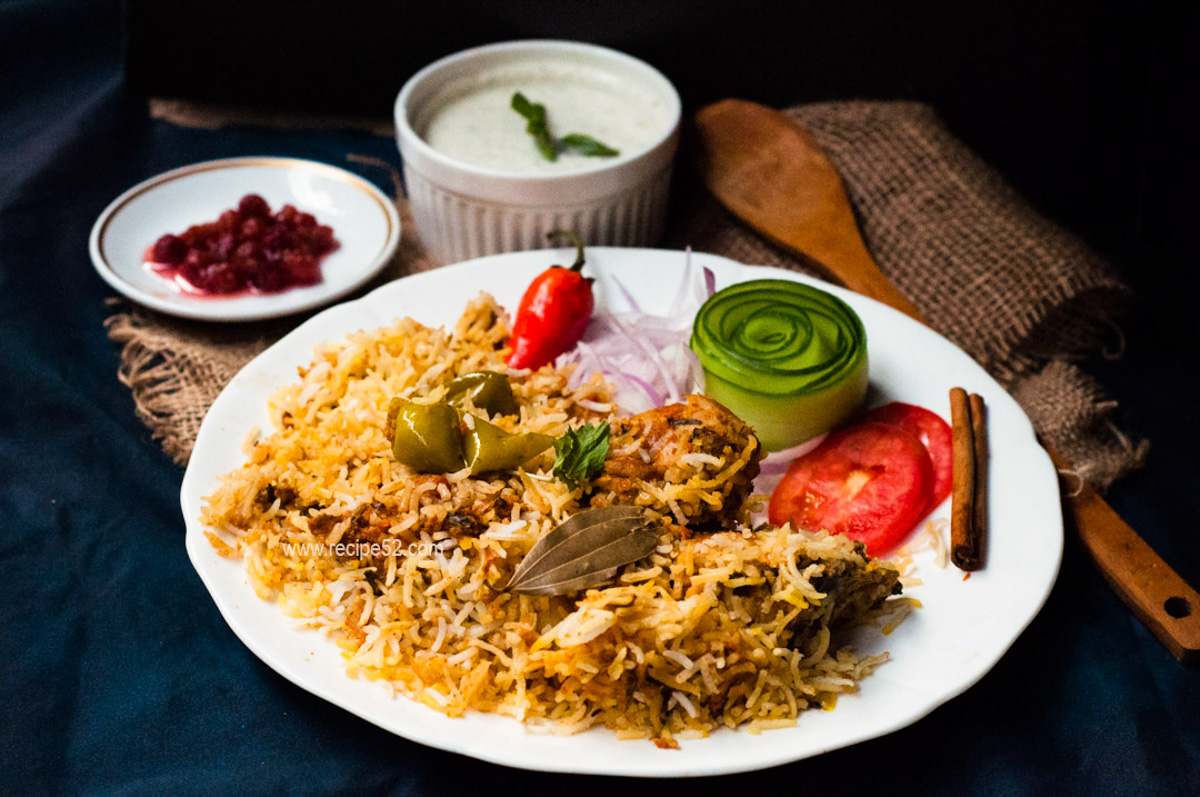
It is South Asian rice dish, made with layers of aromatic rice, meat, fried onions and yogurt and/or tomato. Ghee or oil is drizzled from topped and then the Biryani pot is sealed for steaming or 'Dum'.
Classification
Biryani is so popular is South Asian communities that every region and every family have their own version.
Biryani needs a type of meat or main ingredient like chicken, mutton, lamb, beef, vegetable, fish , prawn, shrimps, meat balls (kofta), bone marrow (nalli) and more.
| Region | Main Ingredient | Spice blend | Techniques |
| Some Biryani are named after the region in which it is developed like Sindhi Biryani, Bombay Biryani or Hyderabadi Biryani. | Many Biryani are named after the main meat or vegetable used. Like mutton Biryani, Beef Biryani , fish Biryani, nalli Biryani etc. | Few Biryani are named after spice blends used like Tikka biryani, Tandoori Biryani, white biryani. | Other Biryani are named after techniques used to make like Dum Biryani (steaming), Potli biryani (spice bag), kacha gosht ki biryani. |
So a biryani recipe is combination all 4 factors, region, main ingredient, spice blend and technique making a huge variation in biryani recipes and so you could never ever get bored of it.
My city 'Karachi' is famous for its Biryani throughout the world. Biryani is served here in almost every occasion. In fact, for most families Biryani is fixed on Friday Menu or at least Sunday. I can't think of living without Biryani for more than 10 days. So that's how dear Biryani is for Karachiites and me.
Pulao vs Biryani
| Biryani rice is boiled first and then layered with cooked meat, fried onions, stew, etc. | No Layering is required, meat is cooked first then soaked rice is added to the meat. |
| Meat and rice are cooked separately and then assembled together before dum. | Soaked rice is directly added to pulao pot along with cooked meat, gravy, and water and everything cooks together in one pot. |
| Biryani has white and yellow rice grains. | Pulao rice grains are all of the same color. |
| Some onions and korma gravy is also visible. | The color depends on the spices and ingredients used. |
Secret Tips
1. Rice to Meat Ratio
Having a general ratio of meat to rice before hand will keep you in pro position. You'll never face that meatless only rice stage of biryani pot when biryani about to be consumed completely. Sometimes, you have so much meat but everyone's asking for juicy biryani rice .
Golden Ratio
For rice measurement simple rule is to take equal quantity of meat and rice by weight i.e 1:1 ratio. That means 1 kg meat (chicken, lamb or beef) for 1 Kg rice.
For meat lovers biryani
If you love meat then take 3 parts of meat and 2 parts of rice, i.e for 750 grams meat, you’ll take 500 grams rice.
2. Quality of rice
Rice is main ingredient so quality of rice is very important, use basmati or other good quality long grain rice.
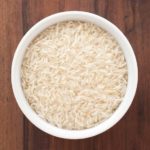
A good Biryani should have separate but fully cooked long rice grains. Type of rice is also significant, use basmati rice or sella basmati rice. Brown rice is good for pulao or khichri but not Biryani. Actually, basmati rice absord a lot of water. So when you boil rice in spiced water. Basmati rice grains absorb flavor and aroma adequately.
3. Soaking Rice
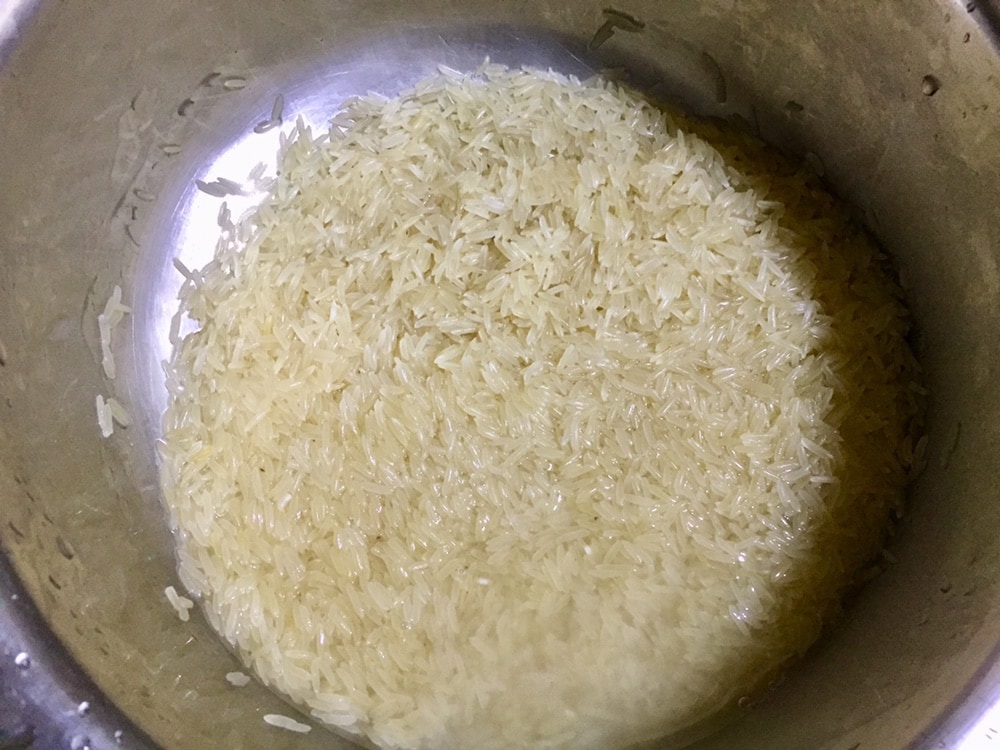
Soaking raw rice before boiling let's the rice puff up completely. Basmati rice require a minimum of 20 minutes soaking while sella rice requires about 45 minutes soaking time. Always check the pack for cooking instructions.
4. Salt
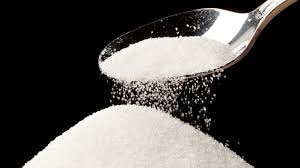
Salt is most important taste enhancer in any food. If your rice lacks in salt, biryani will lack completely in flavor. To know whether the salt is enough in water for boiling rice, taste the water, it should have a soupy salt level.
Salt is most crucial in flavor of every food make sure you use salt in all steps; marination of meat, making gravy and frying potatoes. But that's doesn't mean you over do.
5. Thick bottomed and wide skillet
Always use a wide and thick bottomed pot for Biryani. You can also put rice pot on griddle/tawa if your skillet has thin base; to save rice that are at the bottom of pot from burning. Keep the griddle/tawa under the skillet for re-heating biryani too. Always re-heat biryani on medium or low flame.
6. Cooking time:

For perfect biryani look every grain of rice should be separate. The overcooked meshy rice is nightmare for any biryani lover. Make sure rice are semi cooked about 70% cooked. After soaking, boil Basmati rice for 10 minutes or less. Always check for visual signs.
One tip to test doness of rice is to mesh a grain of boiling rice between thumb and finger to check doness. You should have two tiny 'Kani' bits of unmeshed rice left. That is called '2 Kani chawal', and considered ideal for biryani. Rest of rice cooking happens in Biryani pot where rice absorb flavours of meat and spices.
Cooking time can vary upon type of rice so checking the pack for instruction is best way to know.
7. Spiced water for cooking rice
Biryani rice are flavored with spices and are full of aroma. This is attained by boiling rice with whole spices and salt in large pot with plenty of water.
Best way to do this is boil water with salt and whole spices like cumin, cardamoms, pepper, bay leaf etc. Stir well till you see a little change in color of water. Then add soaked rice and cook for 10 minutes or less until rice are 70% cooked or reach '2 Kani' stage.
If you are new to Indian cooking you'll like next few tips. Whole spices like pepper, bay leaves, cardamom are for aroma only, they release their juices and flavors in rice. Do not bite them. Just put aside like you do with bones.
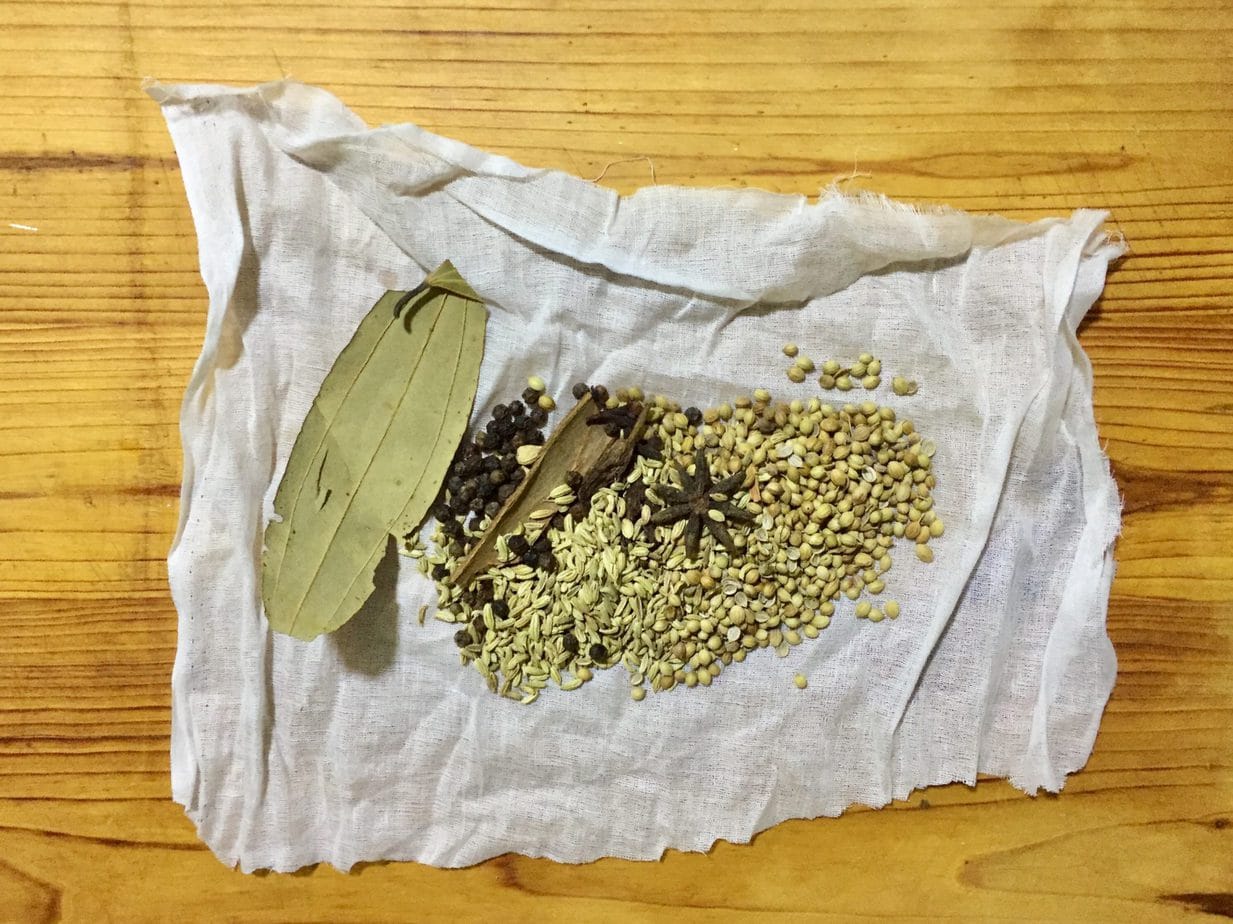
If you don't like whole spices in rice, you can also wrap these spices in a muslin cloth to form a spice bag. Just remove spice bag before serving.
8. Make ahead Biryani Korma
You can make korma gravy of Biryani a few hour ahead or even a day ahead. In that case the fried onions will puff up and soak water so add ¼ cup extra water or more if gravy is too dry. Korma gravy should have thick juicy gravy. It shouldn't be dry.
9. Bhunnofying
There are different types of Biryani. Some Biryani call for making a rich korma gravy. A delicious korma is one which is 'Bhunna' well. Some Biryani like Degi Biryani call for frying meat with spices until color changes to golden. This is also 'Bhunnai or 'bhonofying'.
Bhonofying means cooking on high flame till most water dries and oil clearly separate on sides of pot. This step is most crucial through out Pakistani cuisine. If you Bhunofy it correctly, it will be finger linking good. Only problem for bhonofying is you need to add a bit extra oil so it gravy or korma doesn't burn.
- Dum ( steaming) | how to Dum Biryani on gas
Steaming is most important step of biryani making. When you assemble meat and rice with other ingredients in biryani pot. The rice that are under cooked absorb the gravy moisture. As the pot gets heated the moisture from gravy rises and form steam. This steam needs to be trapped in the pot so rice puff up in this aroma filled steam. This is called 'Dum' technique of biryani. To achieve this you seal the pot by one of these ways.
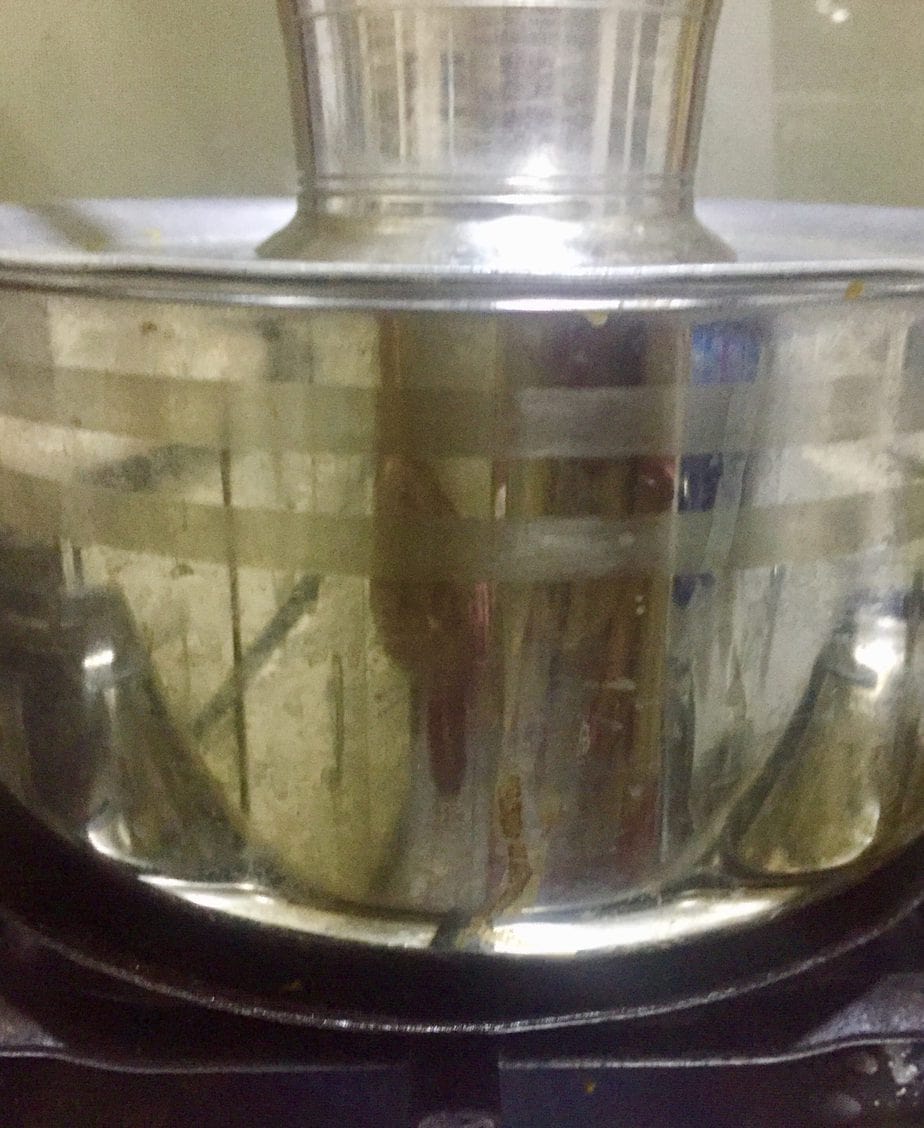
For this either use a tight lid and put some weight on top (easy and practical method)
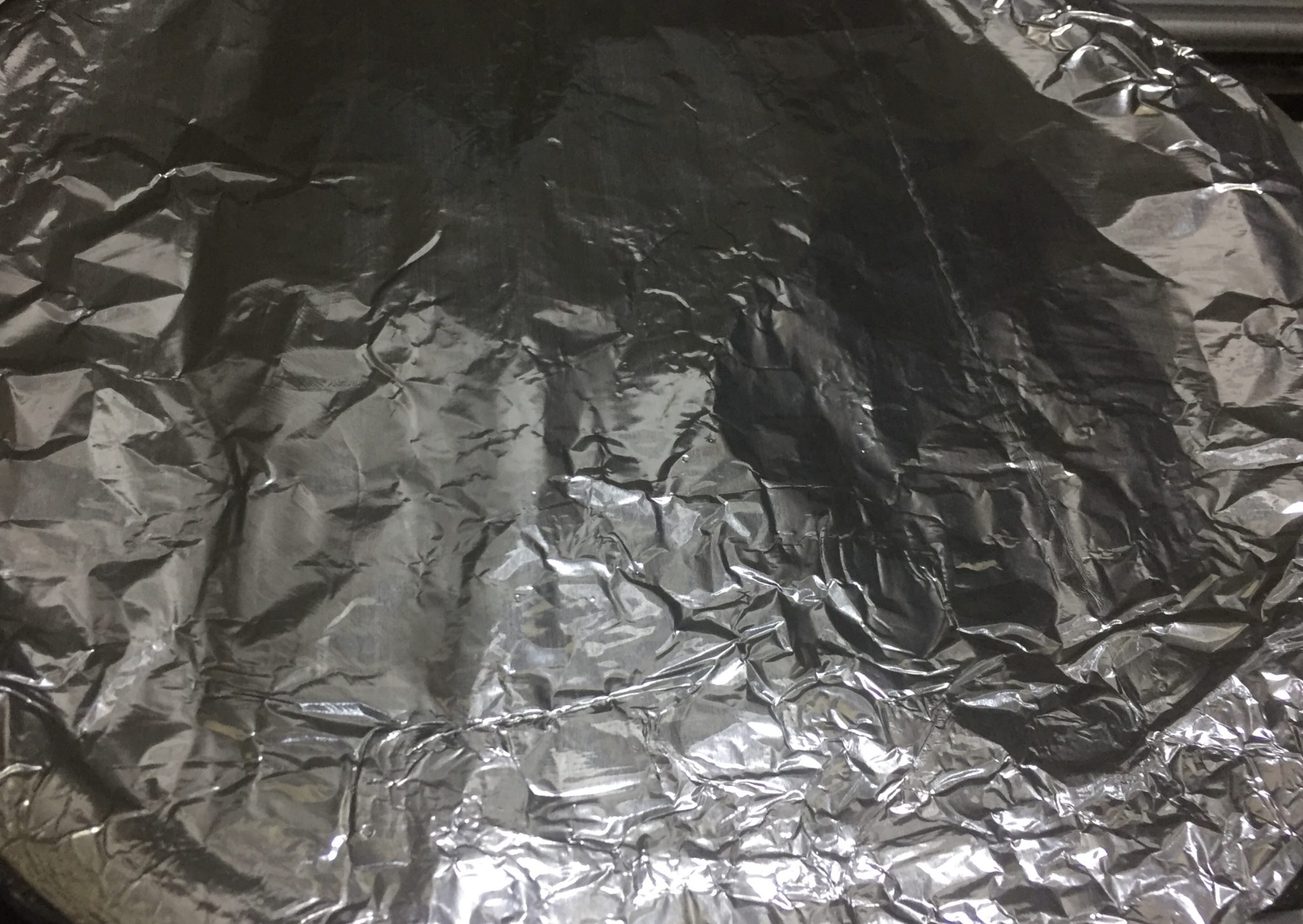
Cover pot with aluminium foil and then place lid (commercially used method)
Or seal the edge of pot with roti dough (traditionally used method)
The biggest secret is dum right before serving. Fresh biryani right after dum tastes best, just like freshly baked cookies, you can't resist over eating.
11. How to fix Hard and dry biryani rice.
Now, we all have bad cooking days when you have under boiled or over boiled rice below is the tips how to handle.
Hard rice
If your rice are very hard which mean they are under cooked when assembling the Biryani pot, you can add extra water in dum to soften but remember the gravy also has some water.
Soft rice
If your rice turn a bit softer or over cooked. Dry out your Biryani gravy also called korma a bit and add little or no water in Dum (Steaming). Also don't leave Biryani for very long on Dum.
12. Lack of spices
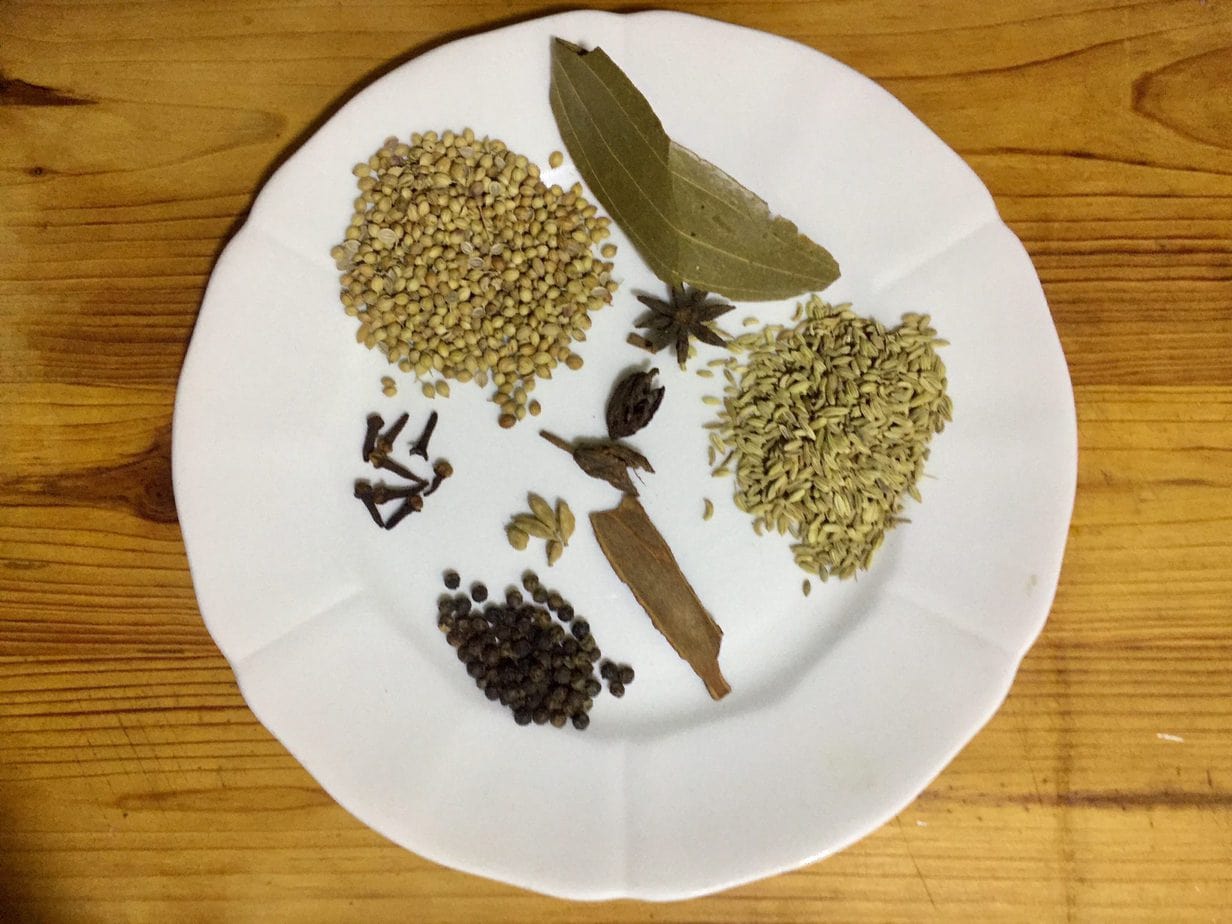
If you don't have one or two spices like, bay leaves and black cardamom, its ok. You can skip them. And use garam masala powder or chat masala or just extra green chillies. Although, some spices like black cumin and saffron really change the aroma and taste of biryani. But, if you have just few basic spices, like cumin, turmeric, pepper and cinnamon etc you can begin Indian cooking with these.
13. Fried onions
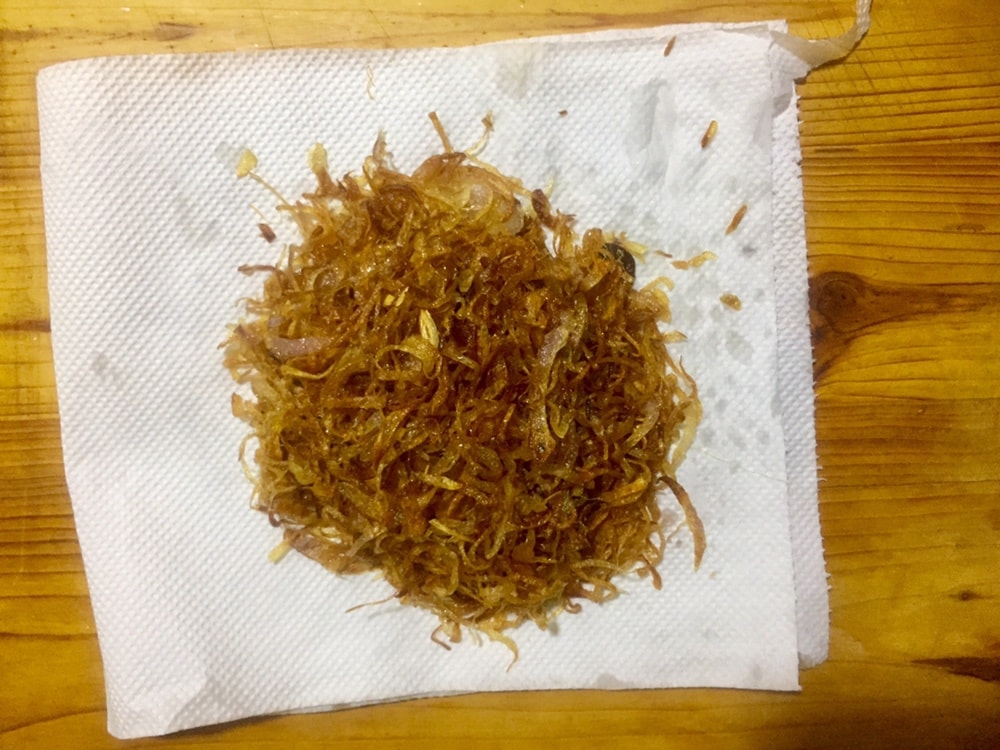
Neither dark nor soggy; since, we use tons of fried onion in Biryani, if your onion slices are over cooked, dark or burnt your Biryani will taste burnt and will have dark stale color. If onion slices are under cooked and not golden, they will not be delicious.
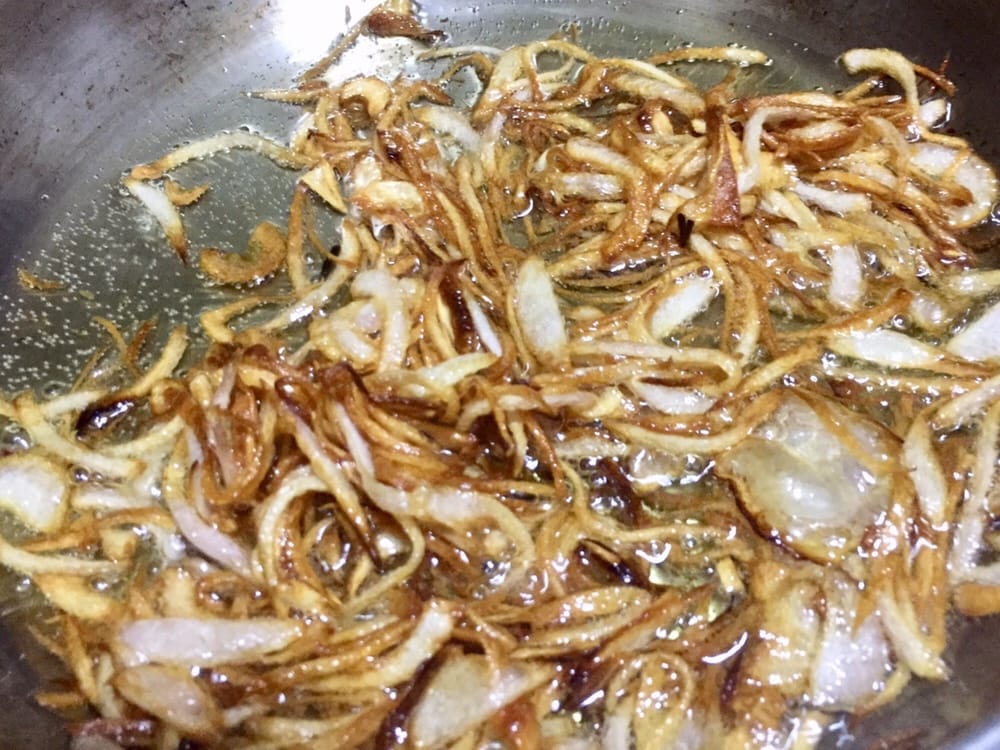
One visual sign is as soon as your onion slices start to separate clearly in oil with light golden color, they are ready.
- Some recipes call for adding spices directly in fried onions without cooling or crushing it so follow the recipe instructions.
- If directed in recipe lift them with a slotted spoon and dry over kitchen towel. Do not crowd them, spread a thin layer of onion slices and let it get cool and crispy. You'll get your perfect onions.
Another useful and general tip for frying crispy onions is onion slices should be very thin. Deep fry onion slices in large pan or wok over medium flame.
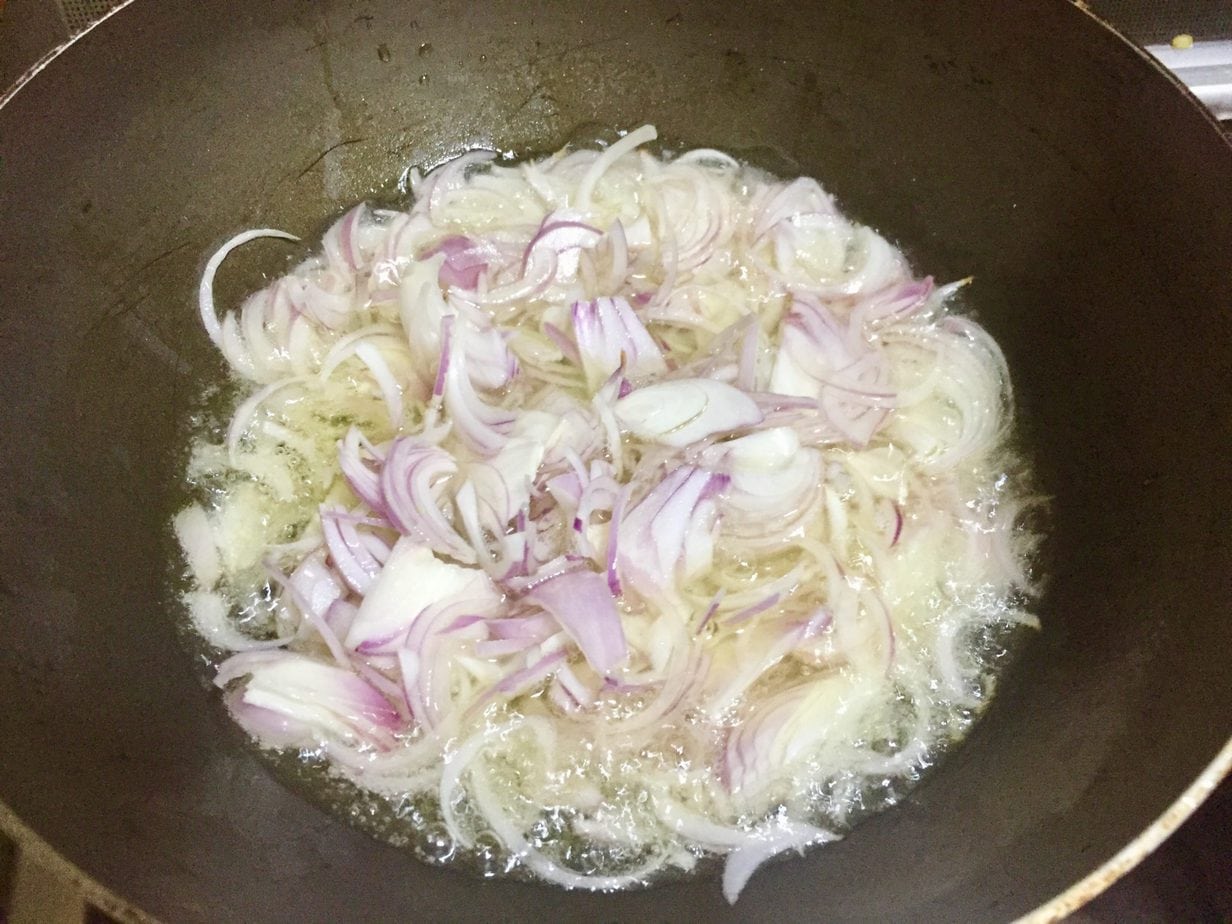
Add ¼ teaspoon or less salt in oil. Always fry onion slices in small batches.
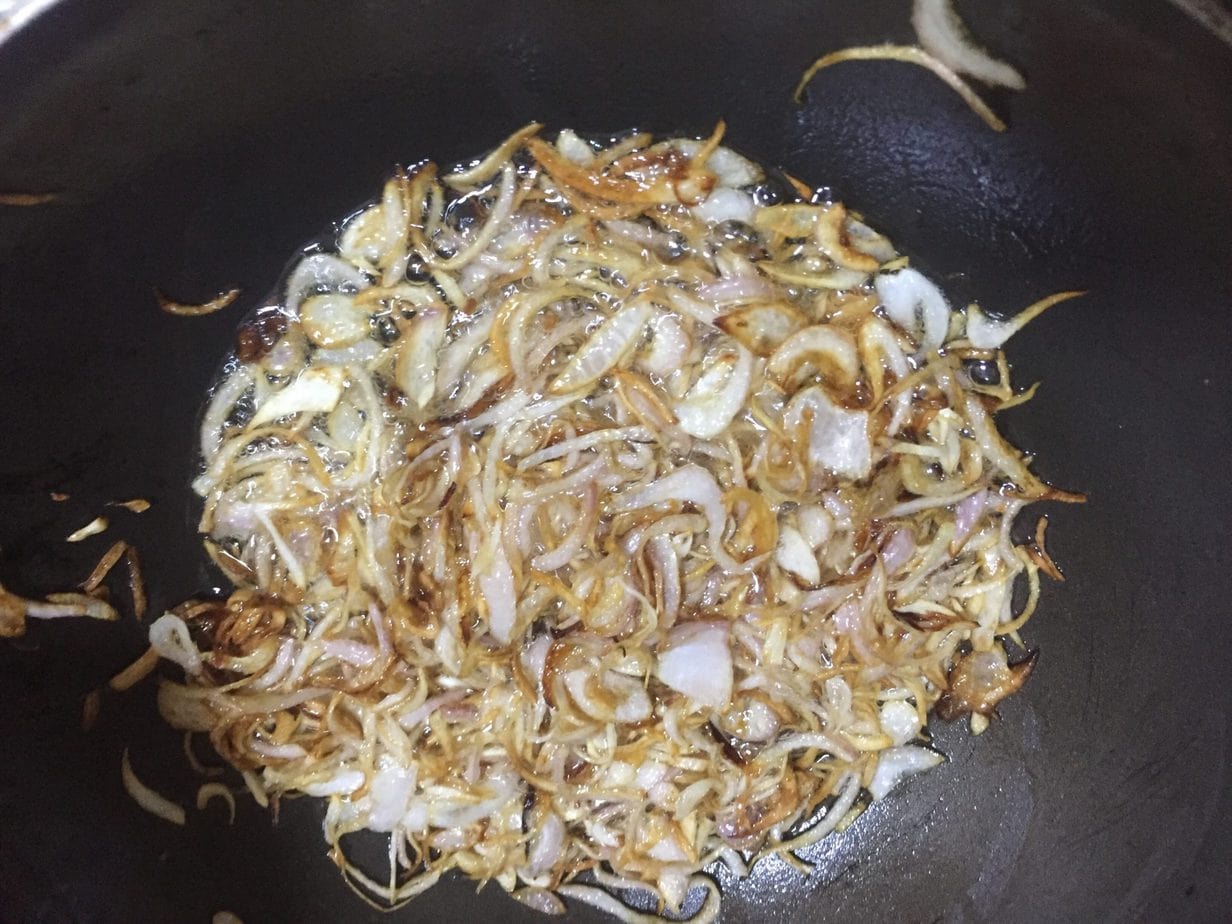
After onions slices start to separate like in above photo. Pick them with slotted spoon and transfer over a strainer.
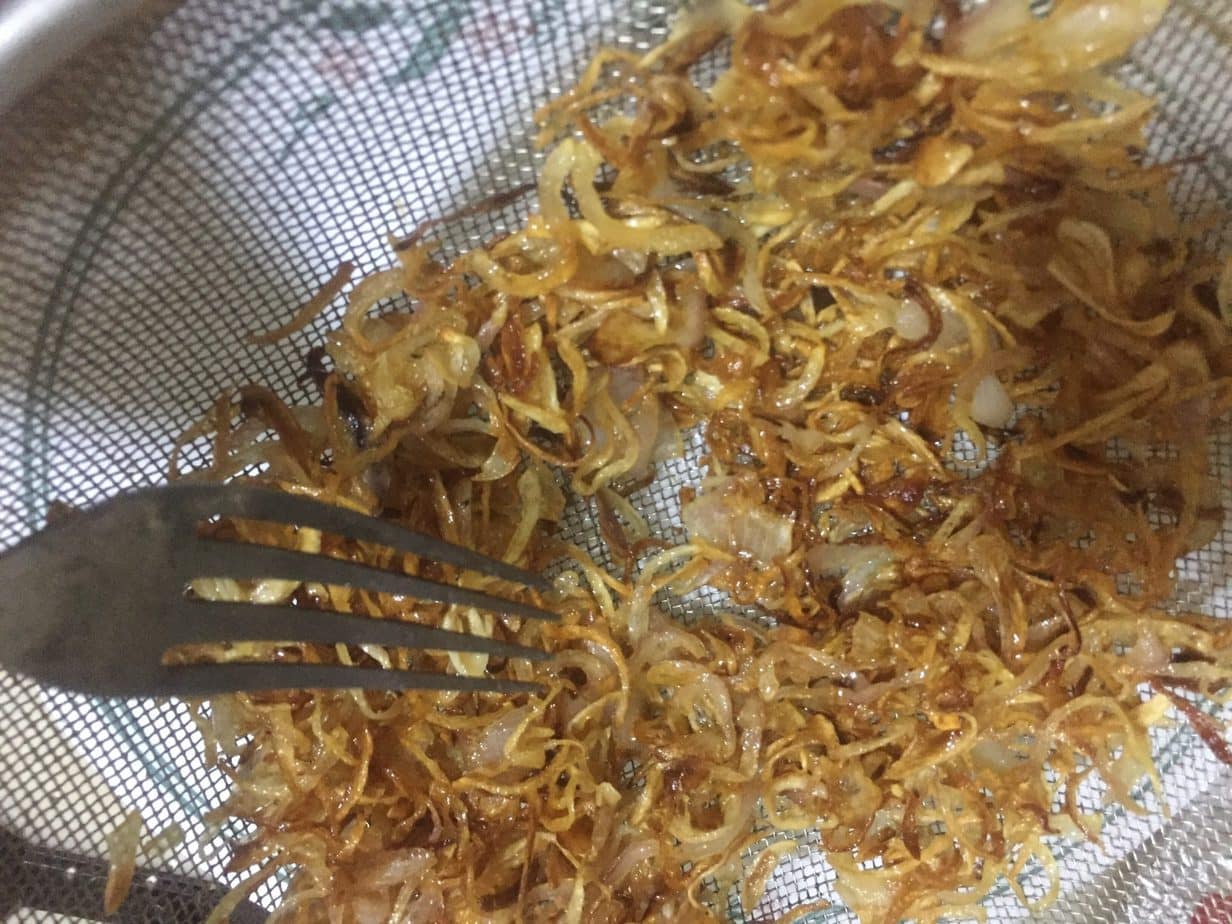
Shake the strainer to cool onion slices and shed any remaining oil lingering over it. Transfer slices over kitchen towels to cool completely.
Now use as required in a recipe. They'll be crispy and you can crush them with hands. You can store these in an air tight container for later use. Fried onion make great garnishing over almost any Indian dish.
14. Amount of oil

The oil, I use in my recipes is least possible with authentic flavors but real biryani calls for even more oil or ghee. So be generous in oil when making Biryani. When traditional mutton biryani is cooked, fat pieces (riwaj) are also added with meat for meaty flavours and greasy moisture. This is 'degi' or 'Dhaba' Biryani secret tip.
15. Serving Estimation.
Another important thing about Biryani is estimation. As Biryani is often made for 'dawat' or formal dinner having a correct estimation of meat to rice is critical.
Or how many kilograms of Biryani for a certain number people can really help overcome stortage of food that is so embarrassing. Or wastage of food which is so difficult to distribute or dump in the worst case.
Biryani made with 500 grams raw rice is enough for 8 average person, if it's a single course meal.
And 250-300 grams raw rice biryani is enough for 8 people, if it’s a three course meal, 1 dessert, 1 savory dish with roti and 1 rice main course.
But these estimate need to be adjusted if all invited are youngster with large appetite or oldies with small appetite.
One very old and traditional method of measuring rice for serving is a fist raw rice for each person. 1 and half fist of raw rice for people with large appetite and ½ fist for children. You measure rice according to invitee and soak rice. This seems crazy way to calculate and quite secret way used by grannies but works very well.
If using above methhod, most of calculation of meat, onion and potato and other ingredients are done with visual estimation. These advanced cooks only follow the method of a recipe and don't care about measures. But this is advanced cooking level, not recommended for newbies.
16. Accompaniment:
Indian / Pakistan food is all about combos. Raita ( yogurt sauce) is must with any Biryani. A little effort will show high rewards in term of praises like 'wah' , 'maza agaya'
Lastly, if it still isn't perfect. Remember, a pot of freshly steamed rice and meat along with kachumber salad, raita and a few chutneys here and there can never be boring. So that'll surly save the day.
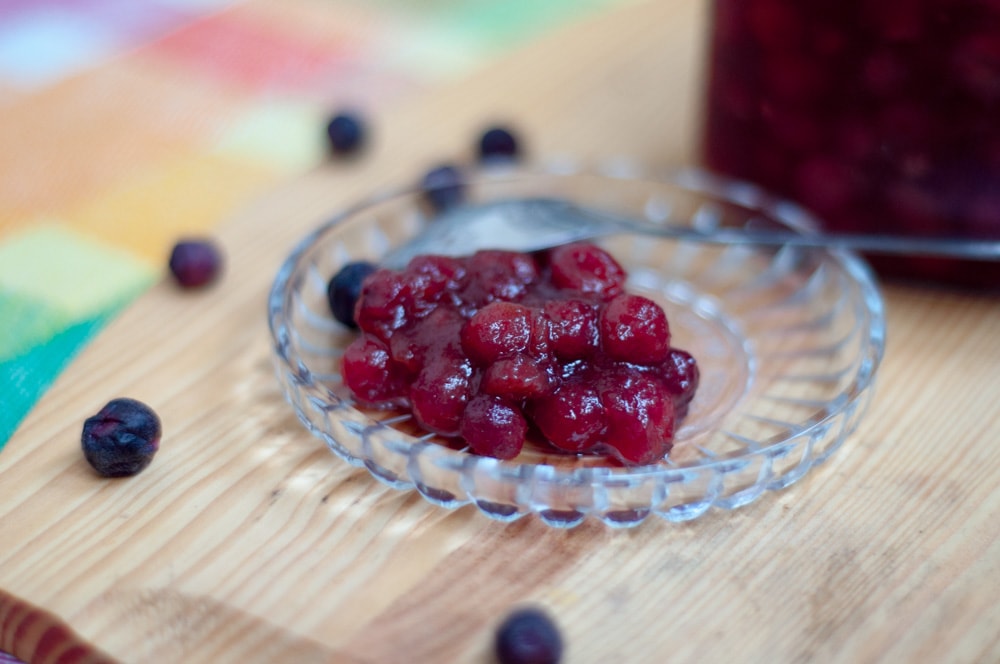
A little common sense and bit of experience will make you pro biryani cook. Good Luck and don't forget to give ?? in comment if you enjoyed the post.
Are you a pro Biryani cook? Share your tips in comment and help others. Check my biryani recipes.

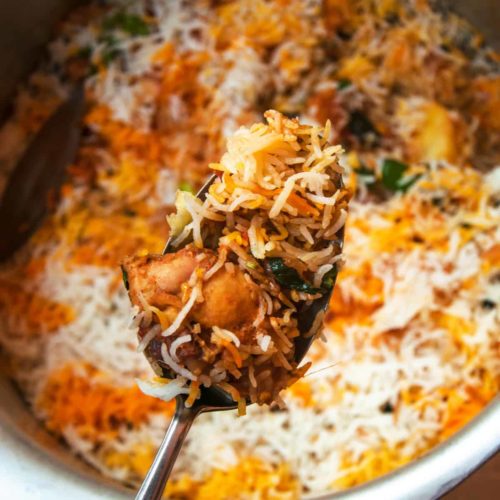
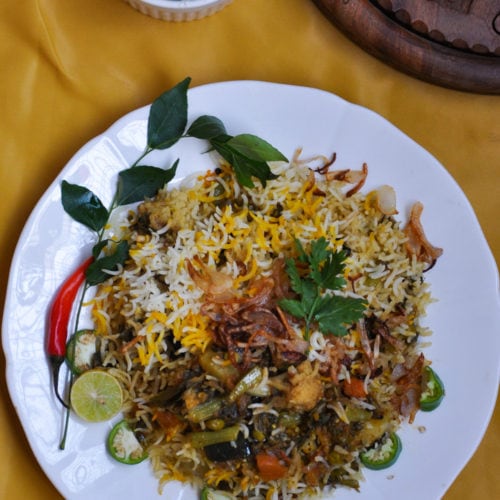
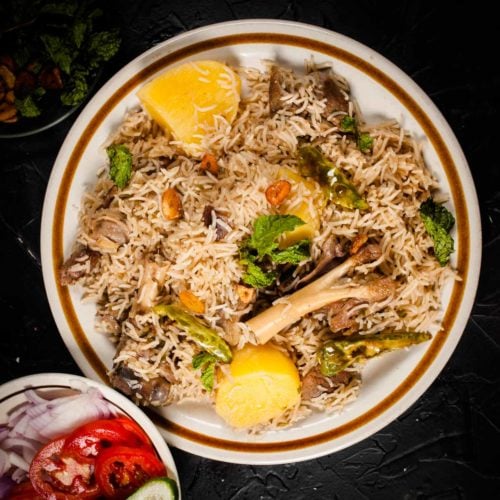
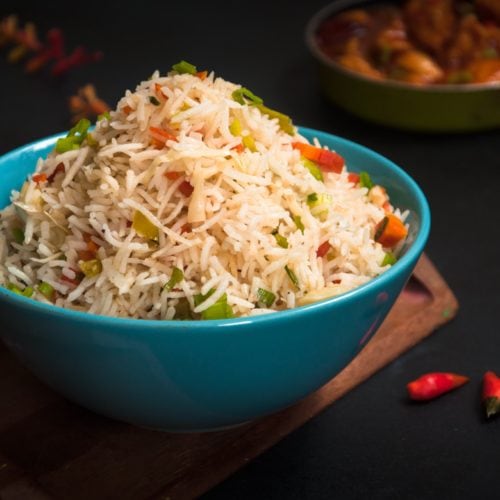

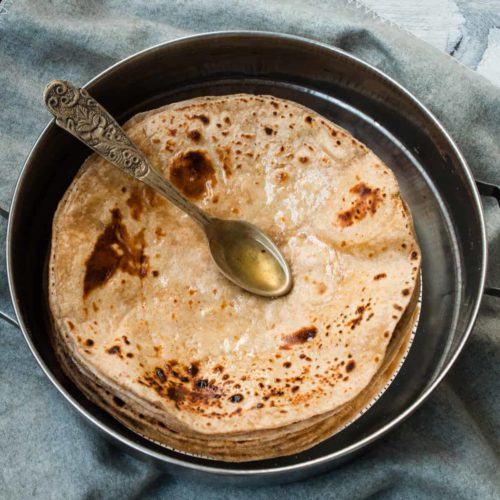
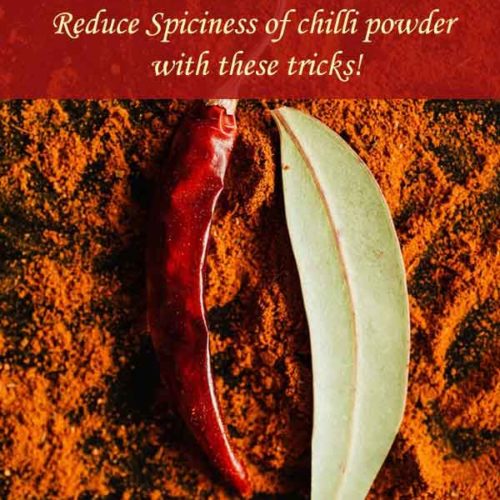
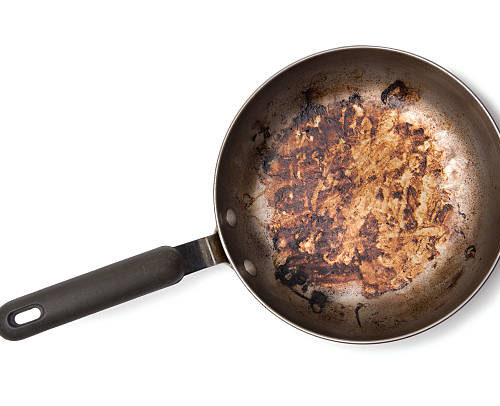
priya says
Hi, I'm a beginner and tried few times
Could you please help me with how much oil or ghee I should use to make 1 KG Chicken biryani (as in 3 glass of rice and 1 KG Chicken).
The reason I'm asking is I feel my biryani gets little dry, no smooth texture or oil content.
Mariam Sodawater says
Hey, you should give my Chicken biryani recipe a try which has very good reviews. I hope this helps.https://recipe52.com/pakistani-chicken-biryani-recipe/
abhai says
i need to know should we use same ratio of masala ingredients to cook 1 kg and 10 kg of biryani, for that matter any dish?
for example if we use 50 gms of masala for 1 kg, in that case should we 500 gms of masala to cook 10 kg. and if not then how much to increase or reduce.
Mariam Sodawater says
It should be the same, but just to be cautious you can hold back some masala and add more after tasting. Like add masala for 9 kg in 10 Kg biryani and add more after tasting. Remember few brands are very spicy so do not follow their recommended quantity on packet blindly. Also, remember that rice will undermine masala flavor so keep spice levels higher than desired in the korma. I hope this helps.
Shubham says
I feel if it works for 1Kg then if managed properly then it should work in case of 10Kg as well
rejaul islam says
nice recipe.It is helthy for us.
Mariam Sodawater says
Thanks a lot.
Sammy says
I make several versions of Biryani, and still decoding secrets from past 20 years.
Below are few tips from my side:
1) meat with bone and fat is very important. this adds that gamy flavor (slow cook yields the best results, releases marrow and melts fat)
2) the yogurt we use is usually hung yogurt or thick
3) Cloves and Cardamom are the most important spice in biryani
4) i use ghee+oil equal ratio when making gravy. ghee has higher heating point + fats
5) Javetri (mace)+cardamom powder, sprinkle when making chicken biryani (during dum)
6) Javetri (mace)+nutmeg+cardamom powder, sprinkle when making goat biryani
7) Use milk instead of water when making gravy
8) saffron should always be soaked in milk for atleast 20 minutes before adding to dum process
9) you can use Kewra water + rose water to enhance flavors (commercially they use Meetha Ettar)
10) royal dishes also use: rose petals (crimson), khus (Vetiver) root, sandalwood powder, betel leaf root.. but these products are not easy to find.
11) mint, coriander, green chilly are not necessary for biryani. But ok for masaledar(spicy) briyani
Happy Cooking!
Mariam Sodawater says
Thanks a lot for sharing your detailed tips. It will benefit users for sure.
Najeeb says
Bhai dhoom tips hai yeah maza agayaa pad key definitely worth trying
Mariam Sodawater says
Thank you a lot for the dhoom comment. 🙂
Margaret Shukla says
PUDINA+MUTTON, IS A MARRIAGE, MADE IN HEAVEN. PUDINA ENHANCES ANY DISH MADE WITH MUTTON. PLACE BAY LEAVES AT THE BOTTOM OF VESSEL, TO PREVENT BURNING OF BIRYANI. PRICK AN ONION, WITH CLOVES,WHILST MAKING THE BIRYANI. USE GRATED RAW PAPAYA, TO SOFTEN ANY MEAT. NEVER EVER FORGET, TO USE DRIED APRICOTS, FOR EXCELLENT BIRYANI! THANK YOU, DEAR MARIAM, FOR YOUR SUGGESTIONS..
Mariam Sodawater says
Thanks a lot, Margaret for amazing first-hand tips. This post needs an update, I will definitely add your tips. Have a nice day.
Shubham says
Milk instead of water? replace water with milk in making gravy or just add some amount of milk like in some ratio?
Anis says
Fantastic! The best part was the significance of Bhunofying, it's like either you get it or keep frying your brains. Without the essence of 'Nafasaat' and 'Lehza' biryani will just remain another dish for many. Taste of spices and oil is what they will look forward to in Biryani.
Would be very helpful if you can provide ratios of rice: meat:potatoes: onions: garlic ginger paste : oil: that goes into standard beef biryani preparation for a dawat gathering of 50 guest.
.
Mariam Sodawater says
Thanks a lot, Anis for the suggestions. This post needs an update. I will definitely provide more information in the updated post.
divya rani says
Thank you for an excellent blog. The information you have given is very interesting and helpful. Will definitely bookmark it!.
Mariam Sodawater says
Thanks for the feedback.
Ismail says
Very handy tips. I am a novice so your tips really helped me. Many thanks.
Recipe 52 says
Thanks a lot for the lovely feedback. Don't forget to leave star ratings.
Neha Patankar says
Amazing tips, u have put it lots of efforts & thoughts in this post. Keep up the good work
Recipe 52 says
Thanks a lot for the lovely feedback. Don't forget to leave star ratings.
L S Prasad says
Greate tips thank you!
Recipe 52 says
I’m really glad, they were helpful for you.
Sebastian says
Hi great stuff,. Kindly make a mention of dum timing pls, it will be o f great help
Recipe 52 says
Thanks for the suggestion, I agree that the post needs update. I’ll definitely add Dum tips.
Pratim Karekar says
Very nicely written. It is very helpful for begginers and reguler cooks also.
We are also 'Biryani Lovers'. I make biryani atleast one to two times a month.
I use little 5/6 strands of saffron, mixed in 1/4 cup milk, after making all layers of biryani. Also I give smoke--(using 2/3 burning coals kept in small dish n pour half tbsp.of ghee in dish,when smoke starts, I keep dish in pot and keep lid on the pot. Thus your biryani tastes very very delicious😋😋
Recipe 52 says
Thanks for amazing tip Pratim. I’ve tried smoking biryani too and no doubt it tastes amazing.
Farheen says
I've never ever commented on a blog before but I had to here. Awesome tips. All very handy. Thanks a ton. I like how you've really said it all.
Recipe 52 says
Thanks a lot, you’ve made my day. 😊